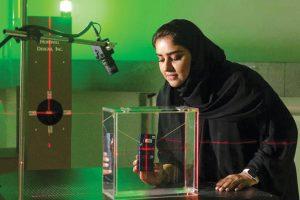ABU DHABI / WAM
Khalifa University of Science and Technology and the Federal Authority for Nuclear Regulation (FANR) announced the UAE’s first Master of Science Programme in Medical Physics to train a cadre of medical physicists to contribute to the robust radiation protection infrastructure in the country.
The programme will also strengthen their competencies and skills, combined with a planned clinical residency programme.
Developed by Khalifa University, the MSc in Medical Physics programme is one of the outcomes of the UAE National Strategy for Education, Training, and Qualification in Radiation Protection. The strategy was developed by the Radiation Protection Committee which is chaired by FANR. The strategy underscores medical physicists’ important role in ensuring patients’ radiation protection during medical exposure in health facilities.
The first cohort of MSc students has already completed their first year and their projects during the year included experiments at the Tawam Hospital in Al Ain and at FANR’s Secondary Standards Dosimetry Laboratory (SSDL).
Christer Viktorsson, Director-General of FANR, said, “There is a growing need for an experienced cadre of medical physicists. Implementing the Master of Science Programme is the first and an important step to qualify them in the UAE. It will strengthen their competencies and have added value to the UAE’s medical and radiation protection sectors to maintain the highest standards in medical service in our country.â€
“FANR is working closely with its stakeholders, including Khalifa University and other hospitals, to ensure the programme is rolled out across the country to achieve its desired goals.”
Dr Arif Sultan Al Hammadi, Executive Vice-President of Khalifa University, said, “Khalifa University aims to be a world-class institution that empowers minds through transformative education, driving the knowledge economy and leading in global innovation. Our academic programmes are aligned with the UAE’s strategic plans for a knowledge-based economy while addressing economic and developmental priorities. We believe this Master’s programme will help develop human capital in this niche area that will benefit not only the UAE but the Arab region and the wider world.â€
Khalifa University’s Master’s programme in Medical Physics is designed to be aligned with international standards and accreditations guidelines established by agencies such as the International Atomic Energy Agency (Iaea), the American Association of Physicists in Medicine, and the Commission on Accreditation of Medical Physics Education.
In 2022, FANR issued a document titled ‘Establishing the Role of the Medical Physicists in the UAE’, covering workshops discussing and clarifying the roles and responsibilities and the qualification schemes for medical physicists to develop a roadmap for future developments.
 The Gulf Time Newspaper One of the finest business newspapers in the UAE brought to you by our professional writers and editors.
The Gulf Time Newspaper One of the finest business newspapers in the UAE brought to you by our professional writers and editors.
